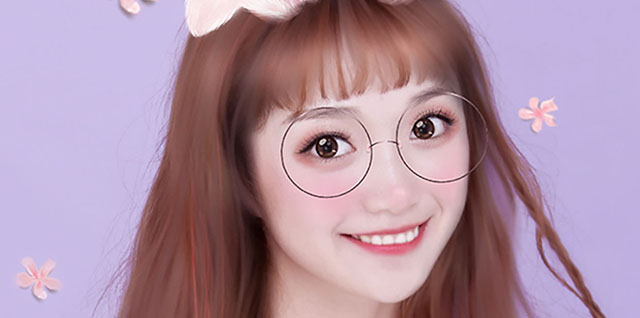活在美顏濾鏡之下的現(xiàn)代人
Before we upload a photo of ourselves to social media, chances are that we'll use an app to smooth our skin, make our eyes look bigger, and give us longer eyelashes and fuller lips.
大家在社交媒體上曬照之前,或許都會(huì)用應(yīng)用來(lái)一鍵磨皮,放大雙眼,加長(zhǎng)睫毛,豐滿唇形。
With a couple of taps on our mobile phone, we're able to get a quick fix and present the "best" version of ourselves to the world.
只需在手機(jī)上輕點(diǎn)幾下,我們便能輕松地向全世界展現(xiàn)“最好”的自己。
However, the problem is, when we simply edit our imperfections away, we're also changing the way we look at ourselves.
然而,這么做的問(wèn)題在于,簡(jiǎn)單地修圖去掉自身瑕疵的同時(shí),我們也改變了看待自己的方式。
Last month, researchers from the US' Boston University School of Medicine published the article Selfies – Living in the Era of Filtered Photographs. The article analyzed photo editing apps' bad impacts on people's self-esteem and their potential to cause appearance anxieties.
上個(gè)月,來(lái)自美國(guó)波士頓大學(xué)醫(yī)學(xué)院的研究人員發(fā)表了一篇題為《自拍——活在濾鏡之下的時(shí)代》的文章。該文章分析了美圖應(yīng)用給人們的自尊所帶來(lái)的不良影響,以及讓人產(chǎn)生外貌焦慮的潛在可能。

The researchers also warned that such apps are blurring the lines between reality and fantasy. "These apps allow one to change his or her appearance in minutes and follow an unrealistic standard of beauty," the article reads.
此外,研究人員也發(fā)出警告稱這類應(yīng)用模糊了現(xiàn)實(shí)與虛幻的界限。“這些應(yīng)用幾分鐘內(nèi)就能改變一個(gè)人的外表,追求的是一種不切實(shí)際的審美,”該文章寫道。
In the past, people may have compared their looks to those of celebrities. But for today's young people, beauty standards are most likely set by what they see on social media. "From birth, they are born into an age of social platforms where their feelings of self-worth can be based purely on the number of likes and followers that they have, which is linked to how good they look," British cosmetic doctor Tijion Esho told The Independent.
在過(guò)去,人們或許會(huì)將自己的相貌與名人進(jìn)行比較。但對(duì)如今的年輕人而言,審美標(biāo)準(zhǔn)大多數(shù)都來(lái)自在社交媒體上看到的形象。“從出生的那一刻起,他們便在社交媒體的時(shí)代下成長(zhǎng)。他們對(duì)于自我價(jià)值的認(rèn)同或許僅僅是基于點(diǎn)贊數(shù)和粉絲量,而這又和外貌息息相關(guān),”英國(guó)美容師提吉?dú)W·艾修在接受《獨(dú)立報(bào)》采訪時(shí)如此表示。
This is why many young people suffer an identity crisis when it comes to how they look. "Now you've got this daily comparison of your real self to this intentional or unintentional fake self that you present on social media," Renee Engeln, a professor of psychology at Northwestern University in the US, told the HuffPost website.
這便是許多年輕人在外貌上產(chǎn)生身份認(rèn)同危機(jī)的原因。“如今你每天都會(huì)將真實(shí)的自我,與在社交媒體上有意無(wú)意地展示出的虛假形象進(jìn)行比較,”美國(guó)西北大學(xué)心理學(xué)教授蕾妮·恩格爾恩在接受《赫芬頓郵報(bào)》網(wǎng)站采訪時(shí)如此表示。
Engeln further pointed out that when people spend too much time making such comparisons, they may become "beauty sick" and find it difficult to accept what they actually look like. "Because between you and the world is a mirror, it's a mirror that travels with you everywhere. You can't seem to put it down," she told The Washington Post.
恩格爾恩進(jìn)一步指出,當(dāng)人們花費(fèi)了過(guò)多時(shí)間進(jìn)行此類比較時(shí),他們或許便患上了“美容病”,甚至很難接受自己真實(shí)的外貌。“因?yàn)闄M亙?cè)谀闩c世界之間的是一面鏡子,它如影隨形,無(wú)處不在。你根本無(wú)法放下它,”她在接受《華盛頓郵報(bào)》采訪時(shí)如此說(shuō)道。
So when we look in a real mirror, we shouldn't think to ourselves, "Do I look as good as myself in the filtered photos?" Instead, we should think, "I feel good; I have my health."
所以當(dāng)我們?cè)谡找幻嬲鎸?shí)的鏡子時(shí),我們不能問(wèn)自己:“我看起來(lái)和美顏照片里一樣好看嗎?”而是要這么想:“我覺(jué)很很好,我有一種健康美。”



